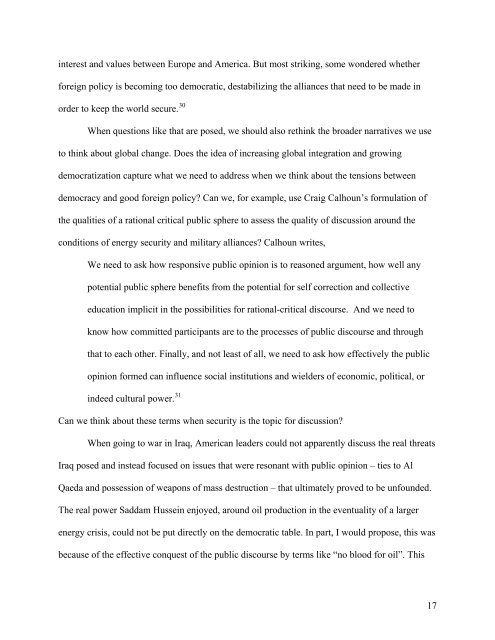from transition to hegemony - The Watson Institute for International ...
from transition to hegemony - The Watson Institute for International ...
from transition to hegemony - The Watson Institute for International ...
Create successful ePaper yourself
Turn your PDF publications into a flip-book with our unique Google optimized e-Paper software.
interest and values between Europe and America. But most striking, some wondered whether<br />
<strong>for</strong>eign policy is becoming <strong>to</strong>o democratic, destabilizing the alliances that need <strong>to</strong> be made in<br />
order <strong>to</strong> keep the world secure. 30<br />
When questions like that are posed, we should also rethink the broader narratives we use<br />
<strong>to</strong> think about global change. Does the idea of increasing global integration and growing<br />
democratization capture what we need <strong>to</strong> address when we think about the tensions between<br />
democracy and good <strong>for</strong>eign policy? Can we, <strong>for</strong> example, use Craig Calhoun’s <strong>for</strong>mulation of<br />
the qualities of a rational critical public sphere <strong>to</strong> assess the quality of discussion around the<br />
conditions of energy security and military alliances? Calhoun writes,<br />
We need <strong>to</strong> ask how responsive public opinion is <strong>to</strong> reasoned argument, how well any<br />
potential public sphere benefits <strong>from</strong> the potential <strong>for</strong> self correction and collective<br />
education implicit in the possibilities <strong>for</strong> rational-critical discourse. And we need <strong>to</strong><br />
know how committed participants are <strong>to</strong> the processes of public discourse and through<br />
that <strong>to</strong> each other. Finally, and not least of all, we need <strong>to</strong> ask how effectively the public<br />
opinion <strong>for</strong>med can influence social institutions and wielders of economic, political, or<br />
indeed cultural power. 31<br />
Can we think about these terms when security is the <strong>to</strong>pic <strong>for</strong> discussion?<br />
When going <strong>to</strong> war in Iraq, American leaders could not apparently discuss the real threats<br />
Iraq posed and instead focused on issues that were resonant with public opinion – ties <strong>to</strong> Al<br />
Qaeda and possession of weapons of mass destruction – that ultimately proved <strong>to</strong> be unfounded.<br />
<strong>The</strong> real power Saddam Hussein enjoyed, around oil production in the eventuality of a larger<br />
energy crisis, could not be put directly on the democratic table. In part, I would propose, this was<br />
because of the effective conquest of the public discourse by terms like “no blood <strong>for</strong> oil”. This<br />
17
















